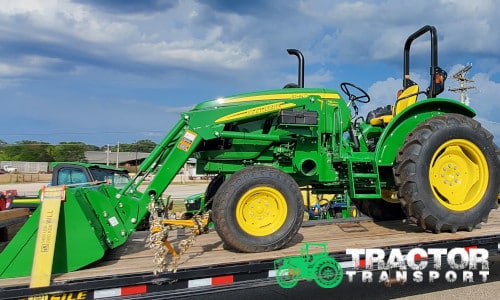
Trusted By All
50K+
Customers
65
Loads
22
Brokers
10+
Years of Experience
The Daily Bale

Natasha Post, Author
TractorTransport.com
Farm equipment is essential to the agricultural sector. It has completely changed how we think about farming, making it less time-consuming and more effective. These mechanical creatures, which range from harvesters that gather crops to tractors used for planting and plowing, are crucial to preserving the world’s food supply.
However, it’s not as easy as it seems to ship these large, powerful devices. The procedure is complicated and might make transporting a difficult chore. Farm machinery sometimes exceeds the size and weight limits for ordinary shipment, necessitating additional equipment and arrangements.
Furthermore, the disassembly for transportation and reassembly after arrival specifications for each piece of equipment may vary. These aspects, as well as the having to adhere to a number of rules and the possibility of damage occurring while on route, make the transportation of farming equipment a substantial logistical task. With the parts that follow, we’ll look at the difficulties involved with moving farm equipment and talk about solutions.

Common Challenges in Farm Equipment Transport
Transporting farm equipment presents a number of special difficulties that may affect the process’ effectiveness and outcome.
- Size
One of the biggest difficulties in this process is the enormous nature of farm equipment. These machinery, like combines and tractors, frequently have dimensions that are larger than those required for shipment, which complicates their transportation. The equipment’s large size might make movement difficult, especially on small highways or in cities. The process is often made more difficult by the need for additional licenses when transporting big cargo. - Weight
Farm equipment is not only substantial in size but also incredibly heavy. These machines’ weight can put a lot of strain on the roads and bridges that support transportation. Transports must carefully plan their routes to avoid places with weight limits lower than their load because many regions have weight restrictions to safeguard these structures. - Specialized Equipment
Farm machinery must be transported using specialist equipment due to its size and weight. Specific trailers or transport vehicles are needed since standard trailers are frequently insufficient to carry such weights. These vehicles are capable of carrying the machinery’s weight and size, but they also make transportation more expensive and difficult. - Custom Trailers
Utilizing specialized trailers created for particular gear is one solution. These trailers have characteristics, including extra-wide decks or adjustable axles that are tailored to the special requirements of farm machinery. They can support the machinery’s weight and size, which facilitates and secures transportation. - Route Planning
Route planning in detail is another option. Transporters can choose the optimal routes that avoid low bridges, limited highways, or regions with weight limits by utilizing cutting-edge technologies. This not only guarantees the machinery’s safety during transit but also saves time and money. - Permits
A crucial aspect of moving big cargo is being aware of and securing the required licenses. These licenses guarantee that the transportation abides by all rules and stays clear of any legal entanglements. Permit applications might be difficult, but they are a necessary step that must be taken.
.
Transporting a Combine Harvester: A Case Study
Think about a situation where a sizable farming company needs to transport a combine harvester from Kansas to a farm in Nebraska. Given the rural and occasionally small roads that had to be traveled, the harvester’s sheer size and weight presented a substantial difficulty.
- The Problem: The combined harvester surpassed the typical load parameters due to its extraordinary breadth and height. It couldn’t have been transported on a conventional trailer without endangering the equipment and support structures along the way.
- Solution: The enterprise hired a specialized transport business, which made use of a unique trailer for big farm equipment. The hydraulics system allowed for the required height adjustments, while the trailer’s movable axles ensured an even weight distribution. A safe and effective route was also mapped out by the transport company’s team of experienced drivers and porters, which avoided low bridges, congested roads, and places with weight limitations.
Farm machinery transportation presents a number of logistical difficulties that must be overcome, and preparation and expertise are essential. These enormous loads can be transported safely and effectively with careful preparation, the use of the right tools, and adherence to the law.
Think about a situation where a sizable farming company needs to transport a combine harvester from Kansas to a farm in Nebraska. Given the rural and occasionally small roads that had to be traveled, the harvester’s sheer size and weight presented a substantial difficulty.
- The Problem: The combined harvester surpassed the typical load parameters due to its extraordinary breadth and height. It couldn’t have been transported on a conventional trailer without endangering the equipment and support structures along the way.
- Solution: The enterprise hired a specialized transport business, which made use of a unique trailer for big farm equipment. The hydraulics system allowed for the required height adjustments, while the trailer’s movable axles ensured an even weight distribution. A safe and effective route was also mapped out by the transport company’s team of experienced drivers and porters, which avoided low bridges, congested roads, and places with weight limitations
Farm machinery transportation presents a number of logistical difficulties that must be overcome, and preparation and expertise are essential. These enormous loads can be transported safely and effectively with careful preparation, the use of the right tools, and adherence to the law.